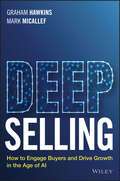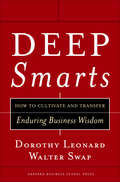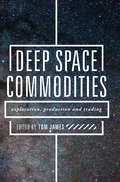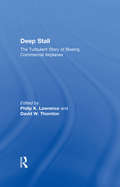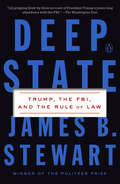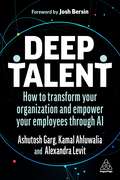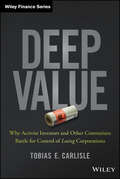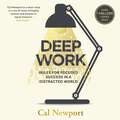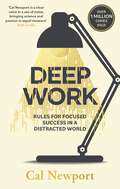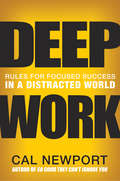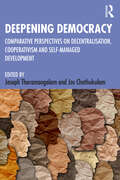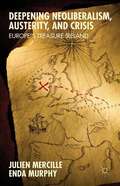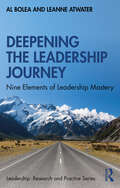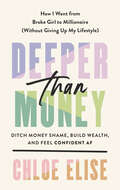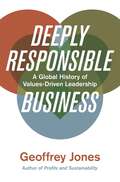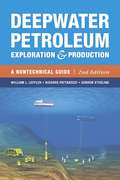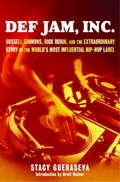- Table View
- List View
Deep Selling: How to Engage Buyers and Drive Growth in the Age of AI
by Graham Hawkins Mark MicallefDevelop stronger, more profitable relationships with your buyers in the digital era Right now, how we buy and sell is evolving dramatically. People have fundamentally changed the way they do business. To put it simply: buyers no longer interact with sellers in the same way. To ensure a profitable future, sales leaders and teams need to embrace this transformation. In the face of globalisation, ecommerce, subscription services, and new digital tools for buyers and sellers alike, you need new strategies to generate successful sales and better bottom lines. Deep Selling shares the cutting-edge sales model you need to create a buyer-obsessed, high-performance culture. Your team urgently needs to embrace the growing suite of digital and AI technologies. But new technologies alone won’t solve all your selling problems. To really maximise your success, you need to evolve your selling frameworks and behaviours. You need to use these new tools in smart ways, embedding them into your sales execution models. In this book, you’ll discover how to: Audit the current sales techniques and cycles in your organisation Transform your sales execution models Achieve organisational buy-in through new performance measures and shared goals for success Use data to drive strategy, and revolutionise your selling with the latest digital and AI tools Build deeper buyer relationships that create more value and improve buyer outcomes With Deep Selling, you and your team will learn how to meet buyers on today’s real-world terms — and engage them more fully and successfully than ever before.
Deep Smarts
by Dorothy Leonard Walter SwapThe asset most valuable to your company's future is lost every time an employee leaves the firmThis asset is more than knowledge, and it is more than intelligence-it is "deep smarts": the tacit "know-how" and expertise that comes only from years of hands-on experience. This book focuses on how to cultivate and harness deep smarts so that it stays in the firm, even if your employees don't.
Deep Smarts
by Dorothy Leonard Walter SwapThe asset most valuable to your company's future is lost every time an employee leaves the firmThis asset is more than knowledge, and it is more than intelligence-it is "deep smarts": the tacit "know-how" and expertise that comes only from years of hands-on experience. This book focuses on how to cultivate and harness deep smarts so that it stays in the firm, even if your employees don't.
Deep Space Commodities: Exploration, Production and Trading
by Tom JamesWelcome to the new space economy... Space is open for business! The dawn of a new space race led by private sector entrepreneurs is upon us thanks to the USA Space Act 2015 and technology advances like SpaceX rockets, which have greatly reduced the cost of space flight. For the first time in history, the advances in both technical and legal infrastructure have opened up exciting opportunities that are already driving the commercial exploration of deep space commodities, Space tourism with Virgin Galactic, and the serious planning for the colonisation of our Moon and Mars. Tom James, a leading commodity and energy market practitioner and author, has brought together top professionals in academia, astropolitics, space engineering, and space law to explore the exciting opportunities and challenges businesses face in the new off-planet economy. With quadrillions of dollars of mineral wealth and frozen water within our reach, the stakes may be high, but so are the rewards.So pack your bags, fasten your oxygen mask and let’s get ready to boldly take business where business has not gone before...
Deep Stall: The Turbulent Story of Boeing Commercial Airplanes
by Philip K. Lawrence David W. ThorntonDeep Stall applies a framework of strategic analysis to the Boeing Company. Boeing is the world's largest aerospace / defence company, with turnover in the region of US $60bn. The book examines the relative decline of Boeing in the civil aircraft market in relation to European manufacturer, Airbus. The aim of the book is to utilize the concept of strategic value to explain Boeing's decline. The authors define this concept as investment in people and technology to leverage future market success by developing innovative new products, arguing that Boeing has neglected strategic value in favour of shareholder value, defined in terms of short-term cash benefits. The rationale for the book exists both in the fact that the story in itself is interesting and also in the wider framework of analysis concerning the correct strategic approach for running a high technology business. The argument illustrates what can happen when quarterly returns become the predominant strategic rationale for a company. In the U.S. the business media (Economist, Forbes, Fortune, and Business Week etc) are now focusing on the question of Boeing's decline and the major implications for the U.S. national interest. Boeing is one of the jewels in the US technology crown, but today U.S. jobs and capability are being exported abroad, with most of its aircraft program work based in Asia. This is a hot topic in the US which explains why the business media are now so interested in this question. The book sits squarely in the centre of this debate. Deep Stall concludes with a brief analysis of the recent fight-back that has been evident in Boeing's fortunes and the successful campaign to sell the new 787. The authors probe the question of whether Airbus or Boeing is likely to dominate in the next ten or fifteen years.
Deep State: Trump, the FBI, and the Rule of Law
by James StewartFrom bestselling author James Stewart, the definitive story of the war between President Trump and America's principal law enforcement agencies, answering the questions that the Mueller report couldn't – or wouldn't <P><P>When Trump fired James Comey, he triggered the appointment of Robert Mueller as an independent special counsel and caused the FBI to open a formal investigation into the President himself. This set in motion a chain of events, which would join in unprecedented and potentially mortal combat two vital institutions of American democracy: the Presidency and the Federal Bureau of Investigation, the investigative arm of the Department of Justice. <P><P>The stakes could not be higher: the rule of law itself, the foundation of the American constitution and Anglo-American democracy for centuries. In this epic battle, there is no room for compromise. There can only be winners and losers, to invoke a distinctly Trumpian view of the world. But there is plenty of room for collateral damage. The reputations of both sides have already been harmed, perhaps irrevocably, and at great cost to American democracy and its institutions. <P><P>Drawing on scores of interviews with key FBI, Justice Department, and White House officials, and voluminous transcripts, notes, and internal reports, Stewart tells the dramatic saga of the FBI and its simultaneous investigations of both Hillary Clinton and Donald Trump – the first time in American history the FBI has been thrust into the middle of both parties' campaigns for the Presidency. Packed with drama and a cast of fascinating characters, Deep State goes where others cannot, revealing the truth of the grand and world-changing struggle that has defined the Trump presidency. <P><P><b>A New York Times Bestseller</b>
Deep Talent: How to Transform Your Organization and Empower Your Employees Through AI
by Alexandra Levit Ashutosh Garg Kamal AhluwaliaWhat's the secret to finding the right person for the job? And how do you ensure your existing employees thrive and flourish in the workplace? Deep Talent answers these questions and more, as it demonstrates how AI platforms can help you positively transform your business.Every successful business relies upon an effective workplace culture with employees that are driven, productive and knowledgeable. So it's vital that leaders do everything they can to hire, develop and keep the people who are driving their growth and help them recognize their skills, capabilities and potential. Deep Talent provides strategies and approaches that any business leader can adopt to reinvigorate their workforce. It highlights the rising significance of talent intelligence platforms which, when combined with human instinct, can streamline and enhance business practices.The recent transformation in workplace culture presents a huge opportunity for ambitious business leaders who want to improve their workplace culture and get ahead of the competition. Drawing upon fascinating case studies and first-hand research, Deep Talent provides clear strategies for supporting your workforce and using AI to its full potential. Uncover the cutting-edge ways in which you can reinvigorate the enthusiasm and productivity of your workforce and attract the best talent to your organization.
Deep Trade Agreements: Anchoring Global Value Chains in Latin America and the Caribbean
by Nadia Rocha Michele RutaGlobally, greater integration in international trade and global value chains (GVCs) has been linked to increased GDP per capita and productivity. Latin American and Caribbean (LAC) countries have displayed limited trade openness and weak integration into GVCs. Their trade is roughly one-third of GDP on average, compared with one-half in countries in Europe and Central Asia, as well as East Asia and the Pacific—and that share has not grown since 2000. Although the gaps between potential and actual GVC integration are the result of economic fundamentals—such as geography, market size, institutions, and factor endowments—policy choices matter as well. The region has untapped potential in trade and GVCs to grow in the wake of COVID-19 (coronavirus). Deep trade agreements are reciprocal agreements between countries that seek integration of goods, services, and factors’ markets, or deep integration. Drawing on new data and evidence, Deep Trade Agreements: Anchoring Global Value Chains in Latin America and the Caribbean shows that these agreements can drive policy reforms that can help the region overcome some of its disadvantageous fundamentals. Four areas of deep integration—trade facilitation, regulatory cooperation, services, and state support—are priorities to improve the participation of countries in the region in GVC: 1. Facilitating trade can reduce border delays and ease the challenges caused by the remoteness of some countries. 2. Improving regulatory cooperation can help create larger regional markets by reducing the costs of nontariff measures. 3. Opening the service economy can compensate for factor endowment scarcity and facilitate access to skills and technology. 4. Fostering competition and regulating state support and state-owned enterprises can improve the quality of economic institutions. These areas are increasingly important as global trade tensions persist and economies recover from the COVID-19 pandemic. In these times of uncertainty and upheaval, the policy commitments in deep trade agreements can create a more stable institutional environment to promote the ability of countries to participate in GVCs and to reap the benefits of integration. This work is a product of the regional studies program sponsored by the Latin America and the Caribbean Chief Economist’s Office.
Deep Value: Why Activist Investors and Other Contrarians Battle for Control of Losing Corporations (Wiley Finance)
by Tobias E. CarlisleThe economic climate is ripe for another golden age of shareholder activism Deep Value: Why Activist Investors and Other Contrarians Battle for Control of Losing Corporations is a must-read exploration of deep value investment strategy, describing the evolution of the theories of valuation and shareholder activism from Graham to Icahn and beyond. The book combines engaging anecdotes with industry research to illustrate the principles and methods of this complex strategy, and explains the reasoning behind seemingly incomprehensible activist maneuvers. Written by an active value investor, Deep Value provides an insider's perspective on shareholder activist strategies in a format accessible to both professional investors and laypeople. The Deep Value investment philosophy as described by Graham initially identified targets by their discount to liquidation value. This approach was extremely effective, but those opportunities are few and far between in the modern market, forcing activists to adapt. Current activists assess value from a much broader palate, and exploit a much wider range of tools to achieve their goals. Deep Value enumerates and expands upon the resources and strategies available to value investors today, and describes how the economic climate is allowing value investing to re-emerge. Topics include: Target identification, and determining the most advantageous ends Strategies and tactics of effective activism Unseating management and fomenting change Eyeing conditions for the next M&A boom Activist hedge funds have been quiet since the early 2000s, but economic conditions, shareholder sentiment, and available opportunities are creating a fertile environment for another golden age of activism. Deep Value: Why Activist Investors and Other Contrarians Battle for Control of Losing Corporations provides the in-depth information investors need to get up to speed before getting left behind.
Deep Work: Rules for Focused Success in a Distracted World
by Cal NewportOne of the most valuable skills in our economy is becoming increasingly rare. If you master this skill, you'll achieve extraordinary results.Deep Work is an indispensable guide to anyone seeking focused success in a distracted world.'Cal Newport is exceptional in the realm of self-help authors' New York Times'Deep work' is the ability to focus without distraction on a cognitively demanding task. Coined by author and professor Cal Newport on his popular blog Study Hacks, deep work will make you better at what you do, let you achieve more in less time and provide the sense of true fulfilment that comes from the mastery of a skill. In short, deep work is like a superpower in our increasingly competitive economy.And yet most people, whether knowledge workers in noisy open-plan offices or creatives struggling to sharpen their vision, have lost the ability to go deep - spending their days instead in a frantic blur of email and social media, not even realising there's a better way.A mix of cultural criticism and actionable advice, DEEP WORK takes the reader on a journey through memorable stories -- from Carl Jung building a stone tower in the woods to focus his mind, to a social media pioneer buying a round-trip business class ticket to Tokyo to write a book free from distraction in the air -- and surprising suggestions, such as the claim that most serious professionals should quit social media and that you should practice being bored. Put simply: developing and cultivating a deep work practice is one of the best decisions you can make in an increasingly distracted world and this book will point the way.
Deep Work: Rules for Focused Success in a Distracted World
by Cal NewportOne of the most valuable skills in our economy is becoming increasingly rare. If you master this skill, you'll achieve extraordinary results.Deep Work is an indispensable guide to anyone seeking focused success in a distracted world.'Cal Newport is exceptional in the realm of self-help authors' New York Times'Deep work' is the ability to focus without distraction on a cognitively demanding task. Coined by author and professor Cal Newport on his popular blog Study Hacks, deep work will make you better at what you do, let you achieve more in less time and provide the sense of true fulfilment that comes from the mastery of a skill. In short, deep work is like a superpower in our increasingly competitive economy.And yet most people, whether knowledge workers in noisy open-plan offices or creatives struggling to sharpen their vision, have lost the ability to go deep - spending their days instead in a frantic blur of email and social media, not even realising there's a better way.A mix of cultural criticism and actionable advice, Deep Work takes the reader on a journey through memorable stories -- from Carl Jung building a stone tower in the woods to focus his mind, to a social media pioneer buying a round-trip business class ticket to Tokyo to write a book free from distraction in the air -- and surprising suggestions, such as the claim that most serious professionals should quit social media and that you should practice being bored. Put simply: developing and cultivating a deep work practice is one of the best decisions you can make in an increasingly distracted world. This book will point the way.
Deep Work: Rules for Focused Success in a Distracted World
by Cal NewportMillions of copies sold!The bestselling modern classic that sparked a worldwide conversation about the value of concentration—and the true costs of fractured attention.&“I&’m handing you the answer to the overwhelm you feel, and his name is Dr. Cal Newport.&” —Mel Robbins, The Mel Robbins Podcast, author of New York Times bestsellingThe Let Them Theory Deep Work— the ability to focus without distraction on cognitively demanding tasks—is one of the most important abilities you can cultivate in our current moment. It&’s a skill that allows you to quickly master complicated information and produce quality results in less time. And yet, most people have lost the ability to go deep—spending their days in a frantic blur of emails, online meetings, social media, and AI slop, not realizing there&’s a better way. In Deep Work, bestselling author and professor Cal Newport makes the case for reclaiming focus as a critical skill in our digital world, providing step-by step instructions for achieving this goal, including four rules for transforming your daily habits: 1. Work Deeply 2. Embrace Boredom 3. Quit Social Media 4. Drain the Shallows A mix of cultural criticism and actionable advice, Deep Work offers a vitally important message: in our age of constant distraction, focus is a superpower. With inspiring examples and clear rules, Deep Work will teach you to introduce this ability in your own life.&“As a presence on the page, Newport is exceptional in the realm of self-help authors … Six pages in, I powered down my laptop. Twenty pages in, I left the house to buy an alarm clock so that I wouldn&’t have an excuse to sleep next to my phone.&”—Molly Young, The New York Times&“One of the few books I would call life-changing.&” —Tim Maurer, Forbes &“I&’ve read lots of books about productivity and lots of books about distraction. For me, Deep Work is among the best, on both counts.&” —Joshua Rothman, The New Yorker &“[Deep Work] has changed how I live my life. Particularly, it&’s led me to stop scheduling morning meetings, and to preserve that time for more sustained, creative work.&” —Ezra Klein, The Ezra Klein Show
Deep-Buried Large Hydrocarbon Fields Onshore China: Formation and Distribution
by Suyun Hu Tongshan WangThis book analyzes the formation and evolution of the giant hydrocarbon reservoirs based on major basins onshore China. It discusses exploration and research advantages of major basins in China, such as Sichuan, Tarim, and Ordos Basins and also systematically analyzes and summarizes the formation conditions, distribution rules, and main controlling factors of deep oil and gas fields. On this basis, it forecasts the exploration prospect of China's onshore deep oil and gas, providing theoretical guidance and technical support for deep oil and gas exploration breakthrough and large-scale reserves growth. This book focuses on the analysis and discussion of hydrocarbon generation mechanism of deep-paleo source rocks, discusses the accumulation rules of cross-structural reservoir formation and oil-gas enrichment in ancient strata, the combination of gypsum-salt rocks and carbonate rocks, the potential of oil and gas accumulation under salt, the main controlling factors and distribution rules of deep oil and gas fields, and preliminarily grasps the geological understanding of the formation and distribution of deep-large oil and gas fields, namely ①abundant hydrocarbon supplied by two types of source kitchens, ②three large-scale lithologic reservoir rocks, ③hydrocarbon accumulation controlled by three paleoes (paleouplift, paleoplatform margin, and paleofaults), and ④reservoir formation across major tectonic periods. The book serves as a guidance for both researchers and students majoring in petroleum geology and other related fields.
DeepMap: Charting the Road Ahead For Autonomous Vehicles
by Shane Greenstein Nicole Tempest KellerFounded in 2016, DeepMap developed high definition (HD) mapping software and localization services for Level 4+ autonomous vehicles. Traditional navigational maps were accurate to a few meters, which was sufficient for drivers, but not for machine-driven vehicles which required centimeter level accuracy. Autonomous vehicles required a new form of map that was highly precise, produced a 3D representation of the surrounding area, enabled vehicles to locate themselves within the map, provided information for how to navigate safely using the correct rules of the road, and was updated continuously as road conditions changed. DeepMap was not selling a static mapping database, but rather licensing its software under a software-as-a-service model. As a startup with limited resources navigating a nascent market, DeepMap faced uncertainty across several dimensions: the timing of overall AV market adoption, which countries would adopt fastest, which AV segments would move most rapidly, which sensor technologies would become standard, and what impact regulation would have. They also faced the challenge of serving customers on a global scale. As DeepMap looked ahead, it had to decide how and where to focus and allocate its funding in order to achieve its short and long-term objectives.
Deepening Democracy: Comparative Perspectives on Decentralization, Cooperativism and Self-Managed Development
by Joseph Tharamangalam and Jos ChathukulamThis book examines the renewed interest and commitment that countries across the world have shown in recent decades towards adopting models of decentralising, or "downsizing" the state, and moving towards more participatory models of government. It examines systems of decentralised development such as self-managing co-operatives from a global and comparative perspective with a focus on developing countries. Drawing on examples from Kerala and a few other states in India, as well as Cuba, Bangladesh and South Africa among other countries, the book offers critical perspectives on the positive impacts of these experiments and the promises these offer for the future. It discusses the challenges of implementing these models, how well these work in coordination with the civil society and the state, issues of transparency and democratic oversight as well as corruption and capture of power due to entrenched structures of inequality. The volume analyses welfare and development models and self-management interventionsin countering the effects of the COVID-19 pandemic. It also looks at the meritsand demerits of decentralisation in countering the global socioeconomic and environmental crisis and the rise of authoritarian populism in many countries. The book will be of interest to students and researchers of development studies, political science, business, community development, social justice as well as of co-operative management programmes. It will also appeal to students of political economy as well as development professionals, think tanks and policymakers.
Deepening Neoliberalism, Austerity, And Crisis
by Julien Mercille Enda MurphyThis is a book about power. It demonstrates how political and economic elites have used the 2008 crisis as an opportunity to deepen and extend neoliberal ideas and practices. From bank bailouts to austerity, Europe's and Ireland's response to the economic crisis has been engineered specifically to shift the burden of paying for a private sector crisis onto ordinary citizens while investors, financiers, bankers and the privileged are protected. The authors expose the class-based nature of Ireland's crisis resolution under austerity which serves to deepen and extend neoliberalism into every aspect of public policy. As a policy response to the crisis, this fits with the overarching objective of neoliberalism, which is to redistribute wealth and income upwards thereby enhancing the power of corporate and political elites.
Deepening the Leadership Journey: Nine Elements of Leadership Mastery (Leadership: Research and Practice)
by Al Bolea Leanne AtwaterDeepening The Leadership Journey is a compendium of topical (and in some cases imponderable) situations for which leadership is either applicable or in need. This new book uses the nine elements in application to five challenges facing the current generation of leaders: making good decisions in an increasingly complex world; motivating and retaining a qualified workforce; equality and a truly diverse and inclusive workplace; cultivating a positive organizational culture; and thriving in a digital world. Intended for personal leadership development and practicing managers as well as courses on leadership, this approachable guide deepens the reader’s leadership journey based on Al Bolea's "J-Curve" model of leadership and the nine essential elements of leadership mastery introduced in Becoming A Leader.
Deeper Than Money: Ditch Money Shame, Build Wealth, and Feel Confident AF
by Chloe EliseA guide for women to find financial confidence, say goodbye to guilt, and finally get ahead with money without sacrificing what they care about, from money expert, podcaster, and CEO Chloe Elise.This is not your average finance book. Like most people these days, Elise went to college not only with student loans, but also completely clueless as to how debt even worked. Instead of abiding by restrictive, guilt-filled advice, she set off on a new debt-payoff journey where she made the rules. Fast-forward eighteen months, and not only did she become completely debt-free, paying off more than $36,000 of debt, but she did it while traveling and enjoying life in her twenties. And now she&’s sharing how you can do it, too. In Deeper Than Money, Elise demystifies finance for anyone who feels stuck in cycles of guilt around spending. Part practical guide to finance and part motivational kick in the butt to set yourself up for success, this book is all about showing how to live your life, love your finances, and make money matter less. It&’ll have you ready to talk about money at brunch with your friends, and finally allow you to get ahead with money—without skipping the mimosa. Deeper Than Money will help you level up not only your finances, but also your life. Because in order to enjoy the wealth you&’re building, you also need to enjoy the life you&’re living.
Deeper, Richer, Fuller
by Tom PatersonDiscover the true purpose of your life with a patented nine-step process. In Deeper, Richer, Fuller, Tom Paterson, world-renowned business strategist, inventor, and mentor, demonstrates how Christians can become everyday saints, learning to love and help others by living out God's purpose.Through Patterson's patented LifePlan process you can: - Identify important milestones in your spiritual journey - Discover your spiritual roadblocks - Create a life of joyous fulfillment - Deepen your relationship with GodPeppered with personal stories from a lifetime of interactions with world and spiritual leaders--from U.S. presidents to Walt Disney to famous CEOs--Deeper, Richer, Fuller delivers an extraordinary process of spiritual transformation, allowing you to chart your course for the future.
Deeply Responsible Business: A Global History of Values-Driven Leadership
by Geoffrey JonesCorporate social responsibility has entered the mainstream, but what does it take to run a successful purpose-driven business? A Harvard Business School professor examines leaders who put values alongside profits to showcase the challenges and upside of deeply responsible business.For decades, CEOs have been told that their only responsibility is to the bottom line. But consensus is that companies—and their leaders—must engage with their social and environmental contexts. The man behind one of Harvard Business School's most popular courses, Geoffrey Jones distinguishes deep responsibility, which can deliver radical social and ecological responses, from corporate social responsibility, which is often little more than window dressing.Deeply Responsible Business offers an invaluable historical perspective, going back to the Quaker capitalism of George Cadbury and the worker solidarity of Edward Filene. Through a series of in-depth profiles of business leaders and their companies, it carries us from India to Japan and from the turmoil of the nineteenth century to the latest developments in impact investing and the B-corps. Jones profiles business leaders from around the world who combined profits with social purpose to confront inequality, inner-city blight, and ecological degradation, while navigating restrictive laws and authoritarian regimes.He found that these leaders were motivated by bedrock values and sometimes—but not always—driven by faith. They chose to operate in socially productive fields, interacted with humility with stakeholders, and felt a duty to support their communities. While far from perfect—some combined visionary practices with vital flaws—each one showed that profit and purpose could be reconciled. Many of their businesses were highly successful—though financial success was not their only metric of achievement.As companies seek to coopt ethically sensitized consumers, Jones gives us a new perspective to tackle tough questions. Inspired by these passionate and pragmatic business leaders, he envisions a future in which companies and entrepreneurs can play a key role in healing our communities and protecting the natural world.
Deepwater Horizon
by James M. Blossom Earl BoebertIn 2010 BP's Deepwater Horizon catastrophe spiraled into the worst human-made economic and ecological disaster in Gulf Coast history. In the most comprehensive account to date, senior systems engineers Earl Boebert and James Blossom show how corporate and engineering decisions, each one individually innocuous, interacted to create the disaster.
Deepwater Petroleum Exploration & Production: A Nontechnical Guide
by William Leffler Gordon Sterling Richard PattarozziThe new second edition of this authoritative book has retained all the virtues of the best-selling original, explaining the unique challenges of oil and gas exploration and production in the world's deepwater provinces. New chapters on geology and geophysics, rigs, and service vehicles are included, and the engineering and scientific schemes used in deepwater are covered in greater detail. Case studies in several chapters give practical examples, while the final chapter presents the latest technology employed in a "third wave" of industry evolution.
Deere & Co.: Industrial Equipment Operations
by Benson P. ShapiroDescribes the pricing of Deere's crawler tractors used in a variety of construction and industrial applications. Includes a strategic, multimillion-dollar move into the large bulldozer market as well as the pricing of tractors, accessories, and parts.
Def Jam, Inc.: Russell Simmons, Rick Rubin, and the Extraordinary Story of the World's Most Influential Hip-hop Label
by Brett Ratner Stacy GuerasevaIn the early '80s, the music industry wrote off hip-hop as a passing fad. Few could or would have predicted that the improvised raps and raw beats busting out of New York City's urban underclass would one day become a multimillion-dollar business and one of music's most lucrative genres. Among those few were two visionaries: Russell Simmons, a young black man from Hollis, Queens, and Rick Rubin, a Jewish kid from Long Island. Though the two came from different backgrounds, their all-consuming passion for hip-hop brought them together. Soon they would revolutionize the music industry with their groundbreaking label, Def Jam Records.Def Jam, Inc. traces the company's incredible rise from the NYU dorm room of nineteen-year-old Rubin (where LL Cool J was discovered on a demo tape) to the powerhouse it is today; from financial struggles and scandals-including The Beastie Boys's departure from the label and Rubin's and Simmons's eventual parting-to revealing anecdotes about artists like Slick Rick, Public Enemy, Foxy Brown, Jay-Z, and DMX. Stacy Gueraseva, former editor in chief of Russell Simmons's magazine, Oneworld, had access to the biggest players on the scene, and brings you real conversations and a behind-the-scenes look from a decade-and a company-that turned the music world upside down. She takes you back to New York in the '80s, when late-night spots such as Danceteria and Nell's were burning with young, fresh rappers, and Simmons and Rubin had nothing but a hunch that they were on to something huge.Far more than just a biography of the two men who made it happen, Def Jam, Inc. is a journey into the world of rap itself. Both an intriguing business history as well as a gritty narrative, here is the definitive book on Def Jam--a must read for any fan of hip-hop as well as all popular-culture junkies.
